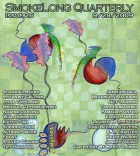The train that derailed was carrying Clyde’s mother and father, the train that it struck was carrying Clyde’s wife, Luanne. He was home at the time with the chicken pox watching an afternoon judge show and the town came to him in unison with a large gift basket filled with fat pears and chocolate-covered popcorn from Harry and David. He knew something was wrong, of course, the moment he opened the door. It was not like the town to bring him pears.
“We’re so sorry for your incredible mortification,” said Lonnie Green, the mayor. As always he wore a sash that read Mayor, lest anyone forget.
“Well, you were never sorry for it before,” said Clyde. There were sirens but he couldn’t hear them yet, and all he could see was the townspeople before him arranged like some solemn, sorry lynching gang, wanting to put their hands on him, to tell him things.
His mother and father had left everything to him. He paid off the house, quit his job, stopped playing the lottery. After a while it became easier not to leave the house and after that it became easier not to turn the lights on and he settled into the living room in his robe and watched M*A*S*H. He considered going off and becoming an army doctor, a wise-cracking one who used humor to mask his feelings and helped people and taught them the greater truths of life. He could do it, too. He had the money, but then he remembered that he was squeamish about such things and just cried and said “Luanne” instead. At night he dreamed of trains arriving and departing. He dreamed of such safety, such banality, he imagined it might settle into his skin like a mineral, soothe him, coax him back to the world again.
A month passed, six. The television stayed on, its blue flare consistent as a respirator. He courted illness to no avail. Inside of him his heart, the traitor, beat just the same.
One afternoon during Springer he saw a commercial for a movie and he decided he would see it. He got his shoes and wallet and walked out of the house and down the street to the movie theater.
He bought a ticket from Jade, the girl with the scar, the thin inlet of satin pink between her nose and upper lip.
“Which showing?” she asked.
“All of them,” said Clyde. He put his money down and pushed it beneath the glass divider with his thin filthy hand.
The movie was about a dog that got lost from its boy and went on a magical adventure to find him. The dog fell in love with a circus bear and then with an alligator; it saved a family from a collapsing house after an earthquake; its voice was provided by Tom Arnold. Clyde could not get enough. He laughed, clapped, cheered. Then the movie ended and began again. Jade watched him from the exit, smoking.
“You can’t smoke in here,” said her manager. “How many times have I told you?”
“And how many times have I told you that I don’t speak English?” said Jade.
Jade stayed at the theater that night to care for Clyde and run the projector. That night and then the next. And the next. She made thin soups in the break-room microwave and garnished them with a fine mortar of crackers. She washed his robe with the employee shirts. She rounded up all usable gummy worms and Whoppers and brought them to him and she reminded him which room was the men’s room whenever he forgot. She watched him, mostly, and what she felt was a horrid mix of love and envy. She sat beside him one morning during a 3 a.m. showing and asked, “What will you do when the movie leaves for good?”
Clyde startled. He looked at her very carefully, as though perhaps she really didn’t speak English and instead barraged him with a loose-tongued series of syllables and diphthongs, unknowable as a poem.
“Where will it go?” he asked.
“Away, like all the others. To DVD. Will you move into a Blockbuster then?”
“Sure,” said Clyde.
Jade laughed but it didn’t sound like a laugh. It sounded as though she was pulling a muscle in slow motion.
“And then what? Move in with some family? Live in their den with their Parcheesi game and their bean bag chairs and wait for casserole night?”
She said, “You can be very hurt and get nothing, did you know? You can have a miserable life and the rest of the world can have nothing for you. If the answer to being miserable is to lose your shit and follow a movie around like some hippie caravan then what does that say to all us poor bill-paying corpses? How do we comfort ourselves? Fine money, fine pears? A fucking sash with the word Mayor across it?” She was breathing very hard now and Clyde’s face was still turned to the screen.
She said, “Look at me. Look. You turn your face and look.”
Clyde turned very slowly and the light angled against the girl’s face was not kind; the scar pressed up like a vein, stark against the white of her skin.
He said, “This is the part where Scraps finds the flying car and the talking goldfish convinces him to fly to Japan.”
“That’s great,” said Jade.
“No, look. You should see this, please.”
“All right,” said Jade, and she opened her eyes.



 The SmokeLong Grand Micro Contest (The Mikey) is now an annual competition celebrating and compensating the best micro fiction and nonfiction online.
The SmokeLong Grand Micro Contest (The Mikey) is now an annual competition celebrating and compensating the best micro fiction and nonfiction online.